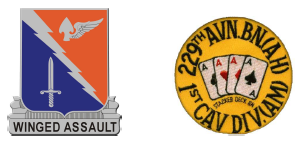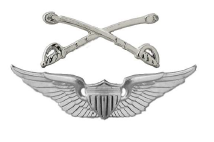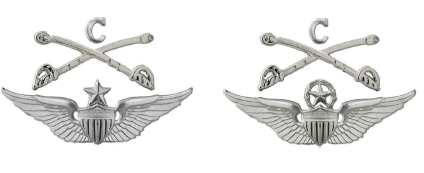Training Syllabus
| 229th Assault Helicopter Battalion | 
|
| 1stCavDiv | |
| UH-1h Standard Operations Training |
This syllabus outlines the the training qualification hierarchy of the 229th.
There are 4 qualifications or stages per the two primary aircraft:
- Basic Wings (BW)
- Mission Qualified (MQ)
- Senior Wings (SW)
- Master Wings
The Objectives and demonstrable Competencies for each designation are outlined below. These training requirements are based on selected "TASKS" from the Uh-1h ATM.
In the sections that follow you will find a link to the corresponding ATM Tasks printed in original form for reference.
To expedite your Basic Wing training, each of the listed competencies and requirements in that section is followed by a breakdown of the relevant ATM Tasks in a concise readable format. Yah, "Cliff Notes"
In time, the same will be offered for Senior Wings, including the Mi-8. Other aircraft depending on demand.
Contents
- 1 INDUCTION
- 2 BASIC WINGS TRAINING & QUALIFICATION
- 3 MISSION QUALIFIED
- 4 SENIOR WINGS TRAINING & QUALIFICATION
- 4.1 11. Senior Wings - Navigate by Pilotage and dead reckoning
- 4.2 Senior Wings - Running Landings
- 4.3 Senior Wings - Select LZ, PUZ & HA reconnaissance
- 4.4 Senior Wings - Slope Operations
- 4.5 Senior Wings - Simulated Engine Failure
- 4.6 Senior Wings - Terrain Flight De-acceleration
- 4.7 Senior Wings - Hover Out of Ground Effect
- 4.8 Senior Wings - Sling Loads
- 5 MASTER WINGS TRAINING & QUALIFICATION
- 6 AIR MISSION COMMANDERS TRAINING & WORKSHOP
INDUCTION
New member induction
Objective: To introduce new members to the 229th AHB training, SOP’s and expectations
Competencies expected: At the end of this session the member will
-be aware of the 229th website and where to locate reference documentation. -be aware of the Battalion training program and how this is linked to their experience and skill. -be aware of Company training program. -be aware of the Battalion office bearers, their roles and responsibilities. -be aware of Company office bearers & senior pilots and their responsibilities.
BASIC WINGS TRAINING & QUALIFICATION
Basic Wings – Aircraft Start
Objective: Perform an engine start and ready the aircraft for operational flight as per Task 1024 UH-1h ATM 2007 & 229th SOP.
Competencies expected: The pilot will demonstrate
-an understanding of the main aircraft instruments, controls and systems. -correct aircraft start-up procedures (not auto-start). -making ready all equipment and systems for operational flight.
Basic Wings – Hover power check
Objective: Perform a hover power check as per Task 1028 UH-1h ATM 2007.
Competencies expected: The pilot will demonstrate bringing his craft to a 5’ stationary hover.
Basic Wings – Perform hovering flight.
Objective: Perform hovering flight as per 1038 UH-1h ATM 2007.
Competencies expected: The pilot will demonstrate
-bringing his craft to a stationary hover in ground effect, for 1 minute. -a hovering turn around the masthead maintaining an appropriate rate of turn. -forwards and sideways hovering flight at a speed no faster than a walking pace. -Taxing from ramp to runway in the hover at a speed similar to a walking pace. -Air taxi flight below 100’ at a safe airspeed for the altitude and conditions.
Basic Wings – Perform a VMC take-off
Objective: Perform a visual meteorological conditions take-off as per Task 1040 UH-1h ATM 2007
Competencies expected: The pilot will demonstrate
-from a hover, smoothly accelerate the aircraft through ETL whilst maintaining an appropriate hover height and desired ground track relative to the conditions. -obtaining and maintaining the desired climb speed (60kts) and rate of climb.
Basic Wings – Perform VMC flight manoeuvres
Objective: Perform VMC flight manoeuvres as per Task 1052 UH-1h ATM 2007
Competencies expected: The pilot will demonstrate
-climbing and stopping the rate of climb to maintain a stable altitude, speed and direction ± 100’ of desired altitude. -accelerating and de-accelerating airspeed whilst maintaining a stable altitude. -90 degree turns <30 degrees of bank with roll-out ± 10 degrees of desired heading. -decent and ascent at approx 500’fpm with a stable airspeed. -entering in and departing from a traffic pattern. -A runway landing.
Basic Wings - Perform VMC approach
Objective: Perform VMC approach as per Task 1058 UH-1h ATM 2007
Competencies expected: The pilot will demonstrate
-selection of a suitable landing area (analyse suitability, barriers, wind, approach path, touchdown point, escape routes, and take-off direction). -that sufficient power exists for the type of approach/landing desired. -a constant approach angle clear of obstacles to desired point of termination (hover) or touchdown(surface). -a rate of closure appropriate for the conditions. -maintaining ground track alignment with the landing direction, as appropriate. -aligning the aircraft with landing direction below 50 feet or as appropriate for transition from terrain flight. -selection of departure path for go-around during approach. -selection of a tentative escape route. -a safe landing.
MISSION QUALIFIED
MQ – Formation skills
– Perform multi aircraft operations
Objective: Perform multi aircraft as per Task 2010 UH-1h ATM 2007
Competencies expected: The pilot will
-participate in a formation flight briefing in accordance with 229th SOP. -demonstrate flying in simple trail and staggered right formations in position 2 -demonstrate reacting to loss of visual contact in accordance with the 229th SOP. -take off, level flight and a normal landings whilst in trail and staggered right formations. -maintaining loose separation (6-10 RD) and correct stack. -flying in positions 2 and 3 in right positioned formations. -maintaining position when the flight changes from one formation to another. -an awareness of the procedures and actions if the formation receives enemy fire. -knowledge of 229th SOP regarding the use of lights, signals and communications in formation flight.
MQ – Communication Skills
Objective: The pilot will develop the knowledge and skills necessary to communicate effectively as a member of a flight and solo if in the vicinity of other aircraft.
Competences expected: The Pilot will demonstrate
-229th radio application theory, installation & configuration. -UH-1h radio equipment knowledge and operation. -knowledge of 229th brevity and standard radio procedures including pre-flight. -in-flight frequency changes whilst in formation flight. -simultaneously operating radios on 2 separate networks, command and flight.
SENIOR WINGS TRAINING & QUALIFICATION
Objective: Navigate by Pilotage and dead reckoning as per task 1044 UH-1h ATM 2007
Competencies expected: Using the tools available in DCS, the pilot will plan a route and by pilotage and dead reckoning demonstrate:
-maintaining orientation within 500m. -arrive at check points / destination near to ETA.
Senior Wings - Running Landings
Objective: Perform a running landing as per task 1066 UH-1h ATM 2007
Competencies expected: The pilot will demonstrate running landings by:
-selecting a suitable landing area. -maintaining ground track alignment with the landing direction. -maintaining a constant approach angle clear of obstacles to desired touchdown point. -touchdown aligned with landing direction ± 5 degrees, at / slightly above effective translational lift (ETL).
Senior Wings - Select LZ, PUZ & HA reconnaissance
Objective: Perform recon. of LZ, Pick up area and Holding Areas as per task 2067 UH-1h ATM 2007
Competencies expected: Using the tools available in DCS, the pilot will demonstrate:
-map, photo, or visual reconnaissance. -that the landing zone (LZ) is suitable for operations and provide accurate and detailed information to supported unit if applicable. -Visually confirm the LZ suitability on initial approach.
Senior Wings - Slope Operations
14.1. Objective: Perform slope operations as per task 1062 UH-1h ATM 2007
Competencies expected: The pilot will demonstrate slope operations by:
-Selecting a suitable landing area. -Knowing the slope landing limitations. -maintaining heading ±5 degrees. -maintaining drift ±1 foot until touchdown and then no drift allowed.
Senior Wings - Simulated Engine Failure
Objective: Perform simulated engine failure as per task 1074 UH-1h ATM 2007
Competencies expected: The pilot will demonstrate this task at a height above 400’ by;
-recognising the emergency, determining the appropriate corrective action and performing all immediate action procedures required.. -selecting a suitable landing area. -correctly terminating this manoeuvre as directed by the IP.
Senior Wings - Terrain Flight De-acceleration
Objective: Perform terrain flight de-acceleration as per task 2036 UH-1h ATM 2007
Competencies expected: The pilot will demonstrate this by:
-accelerating to a given speed and maintaining a heading alignment with the selected flight path. -maintaining the tail clear of all obstacles. -decelerating to a given airspeed or to a full stop without climbing significantly.
Senior Wings - Hover Out of Ground Effect
Objective: Perform a hover out of ground effect check as per task 1030 UH-1h ATM 2007
Competencies expected: The pilot will demonstrate this by
-establish a stable hover altitude of 50 feet or above surrounding obstacles whichever is higher. -determine if aircraft power and controllability are sufficient for manoeuvres requiring OGE hover power.
Senior Wings - Sling Loads
Objective: Perform sling load operations as per task 2048 UH-1h ATM 2007
Competencies expected: The pilot will demonstrate this by
-ensuring the aircraft will remain within gross weight (GWT) and centre of gravity (CG) limitations. -landing close to a load, manual hook up, determining sufficient power is available, take off and maintain trim flight above 100’ agl. -performing a hover and automatic pick-up, take-off and maintain trim flight above 100’ agl. -ensuring a constant approach with the load safely clearing obstacles and terminate over the intended point of landing and perform a vertical descent until touchdown with release of an undamaged load
MASTER WINGS TRAINING & QUALIFICATION
Perform normal flying operations whilst wearing Night Vision Goggles
Objective: The pilot will develop the knowledge and skills necessary to perform normal flying operation in darkness whilst wearing night vision googles.
Competencies expected: During DCS hours of darkness the pilot using night vision googles will demonstrate the successful completion of ANY tasks selected from the Basic or Senior Wings Certification programmes.
Note: Master Wings is still waiting on NVG devlopment by DCS.
AIR MISSION COMMANDERS TRAINING & WORKSHOP
Air Mission Commander WORKSHOP
Objectives:
The pilot will develop the knowledge and skills to lead a flight in both operational and non operational roles.
The pilot will develop the knowledge and skills to plan and lead a mission at any command level
Competencies expected: The pilot will demonstrate
-an understanding and application of all flight lead responsibilities in planning and execution of both training and operational environments. -internal flight comms control and other net comms interaction at periods of high workload. -undertaking all upper command roles and mission / air assault planning procedures. -plan and deliver a flight briefing utilising METT-TC. -plan & deliver a full mission briefing.




